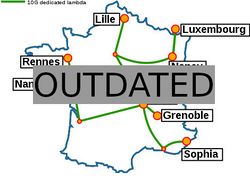Grid5000:Home
|
Grid'5000 is a large-scale and versatile testbed for experiment-driven research in all areas of computer science, with a focus on parallel and distributed computing including Cloud, HPC and Big Data. Key features:
Older documents:
|
Random pick of publications
Five random publications that benefited from Grid'5000 (at least 2937 overall):
- Khaled Arsalane, Guillaume Pierre, Shadi Ibrahim. Toward Stream Processing Elasticity in Realistic Geo-Distributed Environments. IC2E 2024 - 12th IEEE International Conference on Cloud Engineering, IEEE, Sep 2024, Paphos, Cyprus. pp.1-9. hal-04655408v2 view on HAL pdf
- Chih-Kai Huang, Guillaume Pierre. Aggregate Monitoring for Geo-Distributed Kubernetes Cluster Federations. IEEE Transactions on Cloud Computing, 2024, 12 (4), pp.1449-1462. 10.1109/TCC.2024.3482574. hal-04736577 view on HAL pdf
- François Lemaire, Louis Roussel. Parameter Estimation with Integral Elimination. Differential Algebra and Related Topics XII, Apr 2024, Kassel, Germany. . hal-04576171 view on HAL pdf
- Can Cui, Imran Ahamad Sheikh, Mostafa Sadeghi, Emmanuel Vincent. Improving Speaker Assignment in Speaker-Attributed ASR for Real Meeting Applications. The Speaker and Language Recognition Workshop Odyssey 2024, Jun 2024, Quebec, Canada. hal-04495886v2 view on HAL pdf
- Rodrigo Wilkens, Rémi Cardon, Amalia Todirascu, Núria Gala. 3rd Workshop on Tools and Resources for People with REAding DIfficulties (READI 2024). Workshop at the Language Resources and Evaluation Conference (LREC 2024) jointly organized by the ELRA Language Resources Association and the International Committee on Computational Linguistics, 2024, 978-2-493814-34-0. hal-04580167 view on HAL pdf
Latest news
Failed to load RSS feed from https://www.grid5000.fr/mediawiki/index.php?title=News&action=feed&feed=atom: Error parsing XML for RSS
Grid'5000 sites
Current funding
As from June 2008, Inria is the main contributor to Grid'5000 funding.
INRIA |
CNRS |
UniversitiesUniversité Grenoble Alpes, Grenoble INP |
Regional councilsAquitaine |


